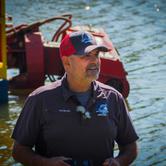Three Beneficial Fish for Pond Maintenance
Imagine a group of highly skilled workers whose only job is to routinely perform specific maintenance tasks on your HOA or golf course ponds. Now imagine that they will work for free, won't ask for a raise, and won't be caught slacking off on the computer watching funny cat videos on YouTube. Seems too good to be true. Right? Certain fish species can add immense value to your golf course or HOA ponds. Whether chomping down on nuisance plants and algae or helping remove excess nutrients from the bottom, these fish live to clean your pond. We will look at a few species of fish you can add to your ponds. These fish will do their part to help keep the water clean!
Mosquitofish
If your ponds are in an area that suffers from mosquito outbreaks, you can help control the population by adding some mosquitofish (Gambusia affinis) to the water. They're a relative of the common guppy, and mosquito larvae comprise the bulk of their diet. They view a mosquito in quite the same way you and I view a juicy T-bone steak. Irresistible. In fact, mosquitofish's appetites are so insatiable that a single fish can devour hundreds of mosquito larvae every day. They're extremely low maintenance—keep them away from any pond cleaning chemicals you may use, and they will grow to a naturally sustaining population. Mosquito fish bears live young, which means that within a few hours of being born, the babies are already on the hunt for a meal of mosquito larvae. A healthy population of mosquitofish can significantly reduce the overall population of mosquitos, which is a massive benefit for homeowners and golfers alike.
Grass Carp
True to their name, the grass carp (Ctenopharyngodon idella) lives to eat nuisance aquatic plants. Originally from Asia, they were imported into the U.S. to help prevent plant species from overtaking a pond. They tolerate a wide range of temperatures, which has allowed them to proliferate. However, in some states, they are considered an invasive species, so check with your local fish and game office before stocking these vegetation-eating machines in your golf course or HOA ponds. Grass carp love moving water, and there is an excellent chance they will escape if your ponds connect to a local lake or river system. Some fish stores sell genetically sterilized grass carp to reduce the chances of them breeding out of control. If you have nuisance plant outbreaks in your ponds, grass carp might be a good way to keep them under control without using potentially toxic and harmful chemicals and herbicides.
Tilapia
Tilapia (Oreochromis aureus) are native to African and Asian countries and are a highly prized food source for tens of millions of people. Many HOAs and golf course managers stock their ponds with them as a natural way of controlling nuisance plants like duckweed. Some pond experts say that they can even help improve a pond's dissolved oxygen levels and water quality. Tilapia love to eat vast quantities of detritus and muck on the bottom of the pond. They're not consuming the muck but rather the bacteria in the muck. The reduction in bacteria helps reduce the amounts of oxygen consumed during the decay process of fish waste and other organic materials. It also ensures that healthy colonies of beneficial aerobic bacteria can thrive, which will help speed up the breakdown of the harmful organic materials on the bottom. Be aware that if your ponds are in an area where the water temperature drops below 45 degrees in the winter, you will most likely see a Tilapia die-off in the fall. These fish prefer warmer waters.
Cleaning Your Ponds Without Chemicals
The above three fish species can significantly help improve the overall health of your HOA or golf course ponds. However, they are not a substitute for regular pond maintenance. Annual pond dredging will help remove the organic muck at the bottom and prevent nuisance algae outbreaks and cloudy water. At American Underwater Services, we specialize in dredging ponds, lakes, and rivers of all sizes. You can also use the organic muck we dredge as a rich natural fertilizer for your grass, trees, or plants. Now is the best time to dredge your ponds in preparation for the upcoming fall and winter seasons. To learn more, call (817) 377-8512.




